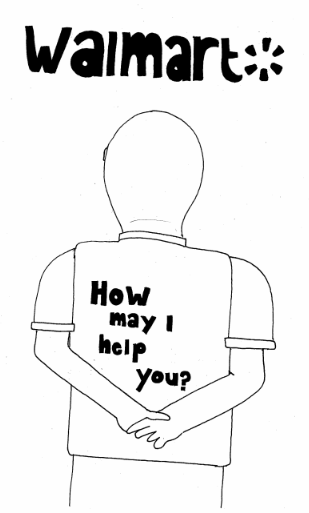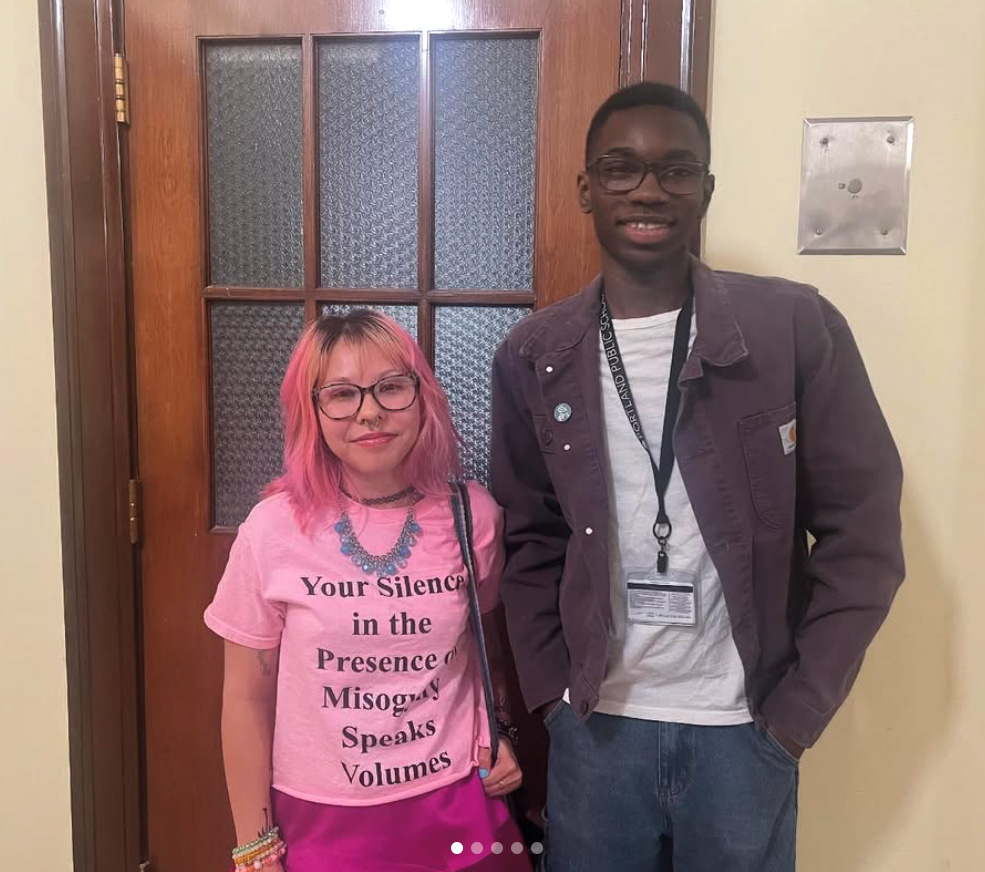Walmart vs. Their Workers: Why Walmart’s New Company Policy May Put 1000 Physically Disabled Employees Out of Work

March 19, 2019
Anyone walking into a Fred Meyer or Walmart has encountered the person standing at the door saying “Hello” to you as you enter. This position, commonly known as a greeter, is a staple of the shopping experience. Walmart has recently changed the policy for their greeters that could potentially put hundreds of their disabled and senior employees out of work.
The official title of the person standing at the Walmart store entrance has always been “Greeter,” but a company-wide policy is rebranding the “Greeter” to a “Customer Host.” This change in name also changes the responsibilities of the employee. Rather than staying near the doorway and greeting customers as they enter and exit, they will now need to meet certain physical requirements. This includes carrying and lifting 25 pounds, standing for long periods of time, and keeping the front of the store clean.
Employees who are currently greeters have the opportunity to apply to the position of customer host, but those unable to meet these requirements, or find another position that they do qualify for, will be laid off. This will result in hundreds of employees with physical disabilities being put out of work.
This change started back in 2016, when Walmart announced that they expected the greeters to become hosts, or else find a different position in the company, and had plans to phase the greeter jobs out. They recently put this policy into effect, and gained national attention when they notified the current greeters that if they are unable to find a different job in the store, they will no longer have jobs by April 25. The idea of someone getting the notice that they won’t have a job anymore due to physical limitations that they have no control over is extremely disheartening. Furthermore, Walmart is also the largest private employer in America. They provide jobs to over 2 million people, including many who may not otherwise have employment opportunities due to disability-based discrimination.
Seeing as this would go into effect in late April, it gives time for a potential change to be made. Action is already being taken in some places to stop this; a notable example of this is in North Carolina. Greeter Jay Melton has cerebral palsy and has worked at Walmart as a greeter for 17 years. After it was announced that he would be removed from the job, the community was outraged and started a petition demanding that Melton be allowed to keep his job. The responses from the signees said that he was someone they had known and enjoyed seeing for years, and others threatened to not shop at Walmart anymore if they were going to lay him off. After about a week of bad publicity, Walmart announced that they were taking “specific steps” to support disabled workers, and that Melton will be allowed to have a job again. Not only would he have a job, but he was upgraded to self-checkout host, which was not a job that was initially available to physically disabled employees.
To put Melton’s situation into perspective, that’s the impact of just one person; there are hundreds more employees who are going to face this same circumstance. Public response should be considered in terms of this policy; after all, they’re the ones shopping and making the company a profit. It also should not have taken Walmart that whole week of bad publicity to provide Melton with a new position. They shouldn’t have threatened to put him out of work in the first place, especially when, in their statement about his new job, they called him a “part of our store” and “well-known throughout the community.” If he’s such a big part of the community, why did they tell him he was going to lose his job, to which he has been loyal for 17 years, just because he can’t stand for long periods of time? He’s doing his job by greeting people, he loves the store, and everyone voiced how much they enjoyed seeing him; so why would you threaten him and hundreds of other greeters to take this away from both the employees and the shoppers?
Customer service is vitally important for stores to ensure consistent income. Working in retail, I learned the value of being a dynamic worker and maintaining a skill set to make the experience good for the customer. It is understandable that companies want to make big moves to boost their revenue and rebrand their company, even if they’re bold. That being said, I completely disagree with what Walmart is doing with this rebrand. I do not think that it is worth displacing hundreds of disabled employees that have contributed to their communities and proved a vital part of the shopping experience for so many customers. It is damaging to Walmart’s image, but more important, it’s leaving thousands of workers wondering where they are going to find a job now because they may have assumed security with Walmart.
They said back in 2016 that “Greeters are a big part of our company and culture.” They also emphasized a convenience factor, saying “an excellent first impression is part of Walmart’s broader strategy to ensure simpler, more convenient shopping.” I think that convenience is key to a good reputation, especially for a superstore like Walmart that has just about everything you need; you want to be able to find everything quickly. However, the greeters are still a huge factor of that first impression, and requiring that they stand for long periods of time and carry items around the front of the store is not something I think is going to make the shopping experience enhanced. The real shopping goes on inside the store, and that’s where convenience and service are most important.
I hope the community response to this new policy will provoke Walmart to reconsider their policy. While Melton’s case was successful, there are still hundreds more workers who need to be considered. This demeaning policy not only would put them out of work, but play into the discrimination of people with physical disabilities and their abilities to be a working member of society.










